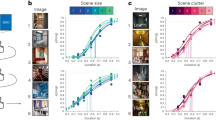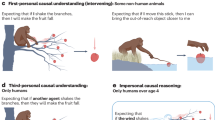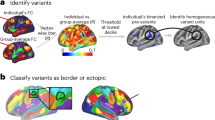Abstract
READING and writing require access to stored knowledge about the spelling of words. Presumably, we recognize chair but not chare or chiar as a word of English, and similarly would write 'chair' but not 'chare' or 'chiar', because we access orthographic representations that specify the identity and the order of the graphemes (abstract letter representations) that comprise the spelling of words1,2. Thus, a fundamental problem concerns the content and structure of the hypothesized orthographic representations, and how information about grapheme order is represented and processed. We present evidence from a brain-damaged patient (N.G.) with unilateral neglect that this information is coded spatially. Unilateral neglect is a disorder clinically characterized by the inability to perceive or respond to stimuli presented to the side contralateral to the site of lesion, despite the absence of significant sensory or motor deficits3,4. The patient made reading and spelling errors only on the right half of words, regardless of length. Furthermore, she produced the same pattern of errors in reading and spelling, irrespective of the topographic arrangement of stimuli in reading (horizontal, vertical or mirror-reversed words) and of the type of response in spelling (written, oral or backward oral spelling). This pattern of performance suggests that order information in orthographic representations is coded spatially in a word-centred coordinate system; that is, in a spatially defined coordinate frame whose centre corresponds to the midpoint of a canonical, orientation-invariant representation of the word and not the midpoint of the word stimulus5.
This is a preview of subscription content, access via your institution
Access options
Subscribe to this journal
Receive 51 print issues and online access
$199.00 per year
only $3.90 per issue
Buy this article
- Purchase on Springer Link
- Instant access to full article PDF
Prices may be subject to local taxes which are calculated during checkout
Similar content being viewed by others
References
Caramazza, A. & Miceli, G. in Brain and Reading (eds von Euler, V. et al. 257–268 (Stockton Press, 1989).
Prinzmetal, W. et al. J. Mem. Lang. 25, 461–475 (1986).
DeRenzi, E. Disorders of Space Exploration and Cognition (Wiley, Chichester, 1982).
Heilman, K. M. et al. in Clinical Neuropsychology (2nd ed.) (eds Heilman, K. M. & Valenstein, E.) 243–293 (Oxford University Press, New York, 1985).
Monk, A. F. Q. Jl. exp. Psychol. A37, 613–625 (1985).
Kinsbourne, M. & Warrington, E. K. J. Neurol. Neurosurg. Psychiat. 25, 334–339 (1962).
DeRenzi, E. et al. Cortex 6, 191–203 (1970).
Bisiach, E. et al. Brain 102, 609–618 (1979).
Baxter, D. & Warrington, E. K. J. Neurol. Neurosurg. Psychiat. 46, 1073–1078 (1983).
Costello, A. & Warrington, E. K. J. Neurol. Neurosurg. Psychiat. 50, 1110–1116 (1987).
Riddoch, M. J. & Humphreys, G. W. in Neurophysiological and Neuropsychological Aspects of Spatial Neglect (ed. Jeannerod, M.) 151–182 (North-Holland, Amsterdam, 1987).
Ellis, A. et al. Cognitive Neuropsychol. 4, 439–464 (1987).
Behrmann, M. et al. Brain (in the press).
Author information
Authors and Affiliations
Rights and permissions
About this article
Cite this article
Caramazza, A., Hillis, A. Spatial representation of words in the brain implied by studies of a unilateral neglect patient. Nature 346, 267–269 (1990). https://doi.org/10.1038/346267a0
Received:
Accepted:
Issue Date:
DOI: https://doi.org/10.1038/346267a0
This article is cited by
-
Visual attention modulates the asymmetric influence of each cerebral hemisphere on spatial perception
Scientific Reports (2016)
-
Object-centred pseudoneglect for non-verbal visual stimuli
Experimental Brain Research (2010)
-
Neglect dyslexia: a review of the neuropsychological literature
Experimental Brain Research (2010)
-
Cognitive impulsivity in specific learning disabilities
European Child & Adolescent Psychiatry (2005)
-
Neglect disrupts the mental number line
Nature (2002)
Comments
By submitting a comment you agree to abide by our Terms and Community Guidelines. If you find something abusive or that does not comply with our terms or guidelines please flag it as inappropriate.



